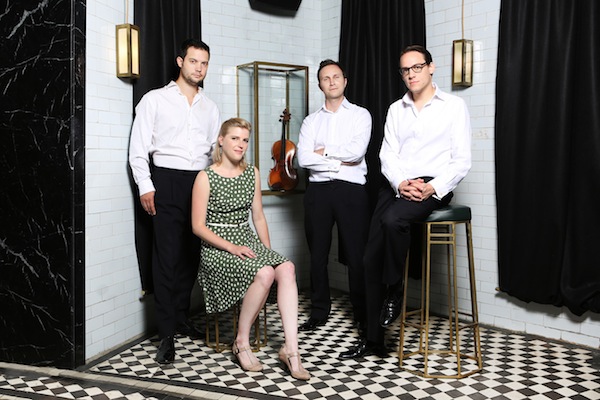Doric Quartet makes an intense and thoughtful Boston debut
The Doric String Quartet made their Celebrity Series debut Thursday night at Longy’s Pickman Hall playing music by Haydn, Britten, and Mendelssohn.
As a group, the Doric musicians leave little to be desired. Their playing is emotionally intense and rhythmically vigorous. Their phrasing is thoughtful and sensitive. They breathe and react – to the music and one another’s gestures – instantaneously. So far as intonation goes, the group’s collective fingerings are spot-on. They are conspicuously well-blended and ideally balanced, richly anchored by cellist John Myerscough’s robust instrument.
Indeed, the low strings – Myerscough and violist Hélène Clément – were particularly resonant on Thursday, so much so that a bit more volume from violinists Alex Redington and Jonathan Stone might have been occasionally warranted. Still, those moments were few and the night’s mostly elegiac program spoke powerfully.
Benjamin Britten’s String Quartet No. 3 certainly did. Written in 1975, it wasn’t premiered until after the composer’s death the following year. Drawing on materials from his last opera, Death in Venice, the Quartet makes an enigmatic valedictory statement.
There are five movements. The first showcases a flickering series of duets that build to a fervent climax before suddenly evaporating. The second movement features driving ostinatos in a variety of contexts. In the visionary third, a stratospheric soliloquy for solo violin is sparsely echoed by the other instruments in their lower registers. Then the accompanying players join together, first in aleatoric exclamations, finally in an ethereal chorus of natural harmonics. The spirit of Shostakovich isn’t far off in the fourth movement, a manic dance that draws on extended techniques in its trio. And the finale balances a chilly recitative with a soaring passacaglia, the latter’s apex giving way to a quizzical last cadence.
On Thursday, the Doric’s reveled in the music’s strange effects, playing them with abandon and knowing menace. And they drew out the moments of fragility with breathtaking assurance. The wispy pulses of the first movement; the desolate loneliness of the middle-movement violin solo; the faultless dovetailing accompaniment in the same; and the shattering sul ponticello figures of the recitative all spoke with immediacy and inner strength. The decay on Myerscough’s final, long-held note sounded like an echo from inside a tomb.
Following the Britten came Felix Mendelssohn’s F-minor Quartet, Op. 80. Written after his sister Fanny’s sudden death from a stroke in 1847, it was completed just two months before Mendelssohn’s own demise (also from a stroke) that November.
Its outer movements are seething and grief-stricken; not even their turns from minor to major offer relief. The middle ones are similarly turbulent, especially the driving second. If the slow third provides some emotional solace, it is still surely one of the saddest movements in the canon.
On Thursday, the Doric members made it sound heart-breaking, playing with warm, golden tone but also great pathos. Their reading of the second movement was a bit deliberate and soft-edged, though the first and fourth were furious and turbulent, especially the many tremolo figures in the opening one and the grim refrain of the last. Throughout, the ensemble articulated the Quartet’s phrasings and dynamic profile with terrific unanimity.
The evening began and ended with music by Franz Josef Haydn. His String Quartet in E-flat, op. 64, no. 6 opened the concert. Its first movement showcased the Doric’s excellent ensemble playing. Violinist Redington turned in a fine, passionate solo during the second movement, while he and second violinist Stone tossed off the Minuet’s inventive duet with aplomb.
Then, after the Mendelssohn, the ensemble returned with one more Haydn piece, the Adagio from the String Quartet in B-flat, op. 64 no. 3. It was gorgeous: played with a serenity that was as touching as the previous work had been unsettling.
The next classical event sponsored by the Celebrity Series will feature violinist Itzhak Perlman, violinist/violist Pinchas Zukerman, and pianist Rohan De Silva in music by Bach, Mozart, Wieniawski, Bartók, Moszkowski, and others. 5 p.m. Sunday, February 18 at Symphony Hall. celebrityseries.org; 617-482-6661.
Posted in Performances





